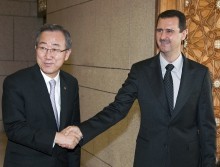
Could a handshake prevent things from getting out of hand? UN Secretary-General Ban Ki-moon (left) meets Syrian President Bashar al-Assad. Illustrative. Photo Courtesy of UN Photo/Eskinder Debebe.
The Butterfly Effect builds off of the theory that if a butterfly flaps its wings, the impact of its action ultimately can impact a hurricane many miles away. In short, it argues that the world is interconnected and even small actions have unexpected consequences.
Well, the Syrian civil war is very much a combative Butterfly Effect: When terrorists join a civil war, nations not even involved in the fighting get attacked. Israel is enduring this first hand, and right now it’s looking like it could get out of hand.
This week’s bombing along the Israel-Syria border that injured four Israeli soldiers was a flare-up not seen along the Syrian border in a long time. As a result, Israeli aircraft openly targeted multiple Syrian military sites because the Syrian army actually played a role in the bombing.
Presumptively, the terror attack was intended as something of a response/warning to Israel after the Israelis bombed another weapons shipment from Syria to Hezbollah terrorists in Lebanon. Not that Israel can be blamed for that: It’s like Al-Qaeda wanting scud missiles that could hit New York. We’d stop that from happening too.
What’s forgotten, however, is that prior to the Syrian civil war, none of this was happening.
Syria generally wasn’t trying to deliver its really advanced weapons to Hezbollah—at least not to this scale or frequency. This is in part because they still needed them long-term, and in part because it wasn’t worth the risk of a fight with Israel.
Israel and Syria kept the border peaceful before the war, despite the long list of issues between them.
Even when Israel reportedly intervened to prevent Syria from severely threatening them—as in the case when Israel bombed Syria’s nuclear reactor to keep them from building nuclear weapons—Syria chose not to respond. Again, not worth the risk, and Syria would’ve been sanctioned for an illegal nuke program.
But civil wars have a funny way of removing a desperate regime’s inhibitions, and now the Syrian authorities have shattered all these norms—which in turn is shattering the decades-long peace along the border.
This blog has highlighted over and over again the dangerous potential for the Syrian civil war to spread. It has already led to a series of rocket attacks and car bombs in Lebanon as militants fighting the Syrian regime take on the Hezbollah terrorists in Lebanon that are helping the Syrian authorities.
Still, while that is tragic, Lebanon has long been unstable, and this is really a case of terrorists fighting terrorists and catching innocents in their wake.
But Israel is a different story.
We’re talking about a powerful nation with an influential economy. We’re talking about the risk of seeing some serious fighting occur not between two militant groups, but two national militaries. We’re talking about the Syrian civil war turning into a regional war.
While that’s still unlikely—it would almost certainly bring the end of the Syrian regime, because they would lose to Israel—the violence is already growing. Who knows what happens when the regime becomes more desperate or when terrorists in the fight get too reckless?
Furthermore, the US government has already highlighted the fact that the Syrian civil war has become a breeding ground for terrorists—and that those terrorists could travel abroad. After all, the Syrian regime may be the current enemy for Al-Qaeda spinoffs, but America is Target No. 1.
So between a quiet border heating up and terrorists using a fight as a training/recruitment center, the Syrian civil war has the real chance to impact your nation and/or the global economy. And that’s why it needs to end, soon.
I know that achieving a ceasefire isn’t ideal. I know that allowing the brutal Syrian regime to get away with murder is tragic. But unless the US military is prepared to win the fight for the rebels, it’s time to cut our losses and seek a ceasefire.
Everyone holds their ground. The innocents of Syria escape the firing range. And the region gets a lot quieter.
Butterflies in Asia may or may not lead to hurricanes in America. But terrorists in Syria are already leading to innocents being hurt in other countries. We can’t stop the first scenario, but we can at least try to end the second one.
(By Joshua Spurlock, www.themideastupdate.com, March 21, 2014)
